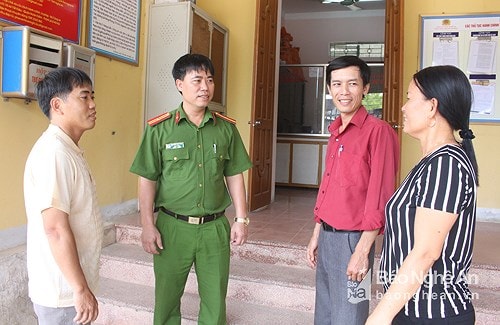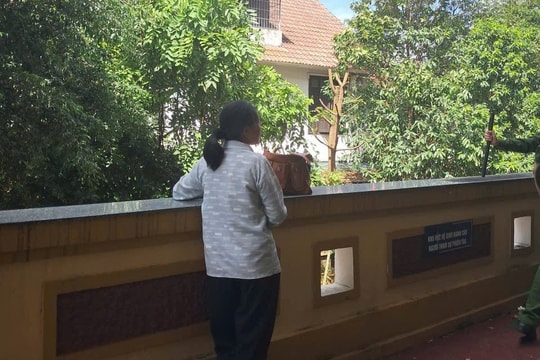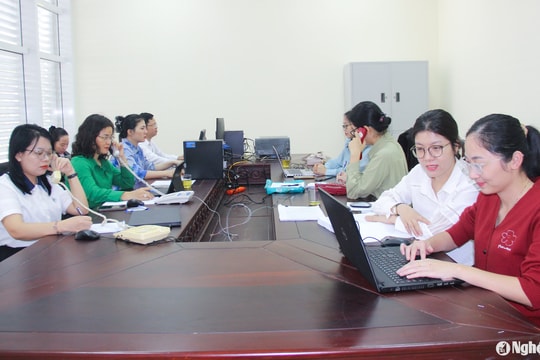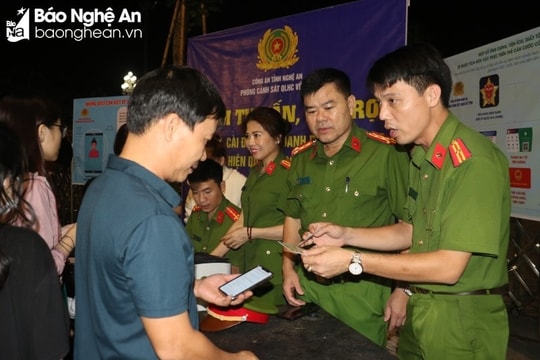Should or should not accept denunciation by phone?
(Baonghean.vn) - This is one of the contents mentioned and discussed enthusiastically by many delegates at the conference to collect comments on the Draft Law on Denunciation (amended) organized by the National Assembly Delegation of Nghe An province on the morning of April 10.
 |
| Deputy Head of the National Assembly Delegation Tran Van Mao chaired the conference. Photo: My Nga |
The Draft Law on Denunciation (amended) consists of 9 chapters and 68 articles, adding 1 chapter and 18 articles compared to the previous Law on Denunciation. It is expected that the Draft Law will be submitted to the National Assembly for consideration at the upcoming 5th session.
The scope of regulation of the law stipulates: denunciation and settlement of complaints and denunciations against violations of the law in the performance of duties, public service and violations of the law on state management in various fields; protection of whistleblowers; responsibilities of agencies and organizations in managing the work of handling denunciations (statute of limitations for denunciations; authority to handle denunciations; protection of whistleblowers.
Discussing related contents of the draft revised Law on Denunciation, forms of denunciation and methods of protecting whistleblowers were contents mentioned by many delegates.
Delegate Le Anh Son - Deputy Chief Inspector of the province, said that the regulation of the form of denunciation should avoid the situation of taking advantage to make false denunciations, affecting the honor and reputation of the accused. However, that does not mean that other convenient forms of denunciation are not accepted in the current era of information technology explosion. The delegate emphasized that regardless of the form, the agency receiving the denunciation must work directly with the denouncer, and must keep the denouncer's handwriting confidential.
Agreeing with the above viewpoint, delegate Nguyen Dong Duc - Provincial Fatherland Front Committee commented that adding denunciation via email, fax, and phone is a new form of expression.
Mr. Duc said that denunciation via email, fax, and phone is essentially just a different way of expressing the two forms of denunciation that the draft Law has stipulated: denunciation by application and direct denunciation. Therefore, regardless of the form of denunciation, it is important that in the initial stage of processing the denunciation information, the competent authority must clearly identify the full name and address (personal identity) of the denouncer, the content of the denunciation must have a basis for verification and conclusion in order to have a basis for deciding whether to accept and resolve the denunciation or not.
 |
| Pay attention to listening and resolving people's petitions. Photo: Archive |
In contrast to the agreeing views, delegate Phan Quy Huong - Provincial People's Procuracy expressed concern that denunciations made via phone would face difficulties in receiving and processing due to feasibility and low accuracy.
Sharing the same view, delegate Dinh Xuan Que - Chairman of the People's Committee of Nam Dan district analyzed that when expanding the forms of denunciation, there is concern that it will lead to widespread and unfounded denunciations. This delegate said that verbal denunciations can be accepted in person, but denunciations by phone to competent agencies, organizations and individuals should be considered. Although Clause 3, Article 19 of the draft law stipulates that when denunciations are made by phone, the recipient is responsible for providing guidance, however, even if there is guidance, denunciations by phone are "not highly reliable". Therefore, it is necessary to focus on resolving complaints by letter and direct denunciations in the immediate future.
 |
| Do a good job of mediation, reduce complaints and denunciations. Photo archive |
At the conference, regarding the coordination relationship between the complaint handler and relevant agencies and organizations in protecting whistleblowers, delegates said that the draft needs to stipulate that the primary responsibility in protecting whistleblowers belongs first to the complaint handler, followed by the responsibility of the coordinating agencies.
Delegates also agreed that the Draft does not stipulate a statute of limitations for denunciation, because the nature of denunciation is that individuals inform competent authorities about violations of the law, helping State agencies prevent, stop and promptly handle violations. Therefore, it is impossible to force each individual to determine whether the statute of limitations is still valid before deciding to exercise the right to denounce.
Regarding the protection of whistleblowers, some delegates suggested that in addition to being protected according to the provisions of the Constitution and the law, in some special cases, there should be more active and proactive measures to protect the rights of whistleblowers, their relatives, and witnesses...
At the end of the conference, on behalf of the Provincial National Assembly Delegation, Comrade Tran Van Mao acknowledged and highly appreciated the delegates' comments. At the same time, these comments will be compiled by the Provincial National Assembly Delegation and submitted to the National Assembly Standing Committee for consideration, amendment and approval in the coming time./
Article 18 of the draft Law on the form of denunciation is: Denunciation is made in writing or orally; written denunciation includes paper copies, faxes, and emails; verbal denunciation includes: the denouncer presents directly orally at competent agencies, organizations, or to competent individuals; denunciation by phone to competent agencies, organizations, and individuals.
The Draft Law also adds stricter regulations on the process of receiving denunciations. Specifically, it specifies the conditions for receiving denunciations corresponding to each form; defines the responsibilities of agencies, organizations and individuals with the authority to handle denunciations to publicly disclose their office address, email address, telephone number, and fax number so that the denouncer can send the denunciation to the correct address (Article 19); defines the responsibility of the agency with the authority to handle denunciations in checking and verifying the conditions for accepting denunciations before deciding whether or not to accept the denunciation (Article 20).


.jpg)





